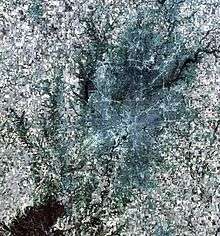Clermont, Indiana
| Town of Clermont, Indiana | |
|---|---|
| Town | |
 Location in the state of Indiana | |
| Coordinates: 39°48′52″N 86°19′18″W / 39.81444°N 86.32167°WCoordinates: 39°48′52″N 86°19′18″W / 39.81444°N 86.32167°W | |
| Country | United States |
| State | Indiana |
| County | Marion |
| Township | Pike, Wayne |
| Area[1] | |
| • Total | 0.67 sq mi (1.7 km2) |
| • Land | 0.67 sq mi (1.7 km2) |
| • Water | 0.00 sq mi (0.0 km2) |
| Elevation | 833 ft (254 m) |
| Population (2010) | |
| • Total | 1,356 |
| • Density | 2,172/sq mi (838.6/km2) |
| Time zone | EST (UTC-5) |
| • Summer (DST) | EST (UTC-5) |
| ZIP code | 46234 |
| Area code(s) | 317 |
| FIPS code | 18-13492[2] |
| GNIS feature ID | 0432641[3] |
Clermont is a town in Pike and Wayne townships of Marion County, Indiana, United States. The population was 1,356 at the 2010 census. It has existed as an "included town" since 1970, when it was incorporated into Indianapolis as part of Unigov. It is legally part of Indianapolis, while retaining a town government under IC 36-3-2-5. The city is known for hosting Lucas Oil Raceway at Indianapolis, consisting of one of the nation's premier short-track ovals and also the premier American drag racing event, the NHRA U.S. Nationals.

History
The first post office at Clermont was established in 1831.[4] Clermont was laid out in 1849.[5]
Geography
Clermont is located at 39°48′52″N 86°19′18″W / 39.81444°N 86.32167°W (39.814339, -86.321575).[6]
According to the 2010 census, Clermont has a total area of 0.67 square miles (1.74 km2), all land.[1]
Demographics
| Historical population | |||
|---|---|---|---|
| Census | Pop. | %± | |
| 1880 | 215 | — | |
| 1910 | 205 | — | |
| 1920 | 240 | 17.1% | |
| 1930 | 448 | 86.7% | |
| 1940 | 465 | 3.8% | |
| 1950 | 824 | 77.2% | |
| 1960 | 1,058 | 28.4% | |
| 1970 | 1,423 | 34.5% | |
| 1980 | 1,671 | 17.4% | |
| 1990 | 1,678 | 0.4% | |
| 2000 | 1,477 | −12.0% | |
| 2010 | 1,356 | −8.2% | |
| Est. 2015 | 1,408 | [7] | 3.8% |
As of the census[2] of 2000, there were 1,477 people, 598 households, and 420 families residing in the town. The population density was 2,167.7 people per square mile (838.6/km²). There were 626 housing units at an average density of 918.7 per square mile (355.4/km²). The racial makeup of the town was 96.41% White, 1.62% African American, 0.07% Native American, 1.22% Asian, and 0.68% from two or more races. Hispanic or Latino of any race were 0.74% of the population.
There were 598 households out of which 28.8% had children under the age of 18 living with them, 58.4% were married couples living together, 9.2% had a female householder with no husband present, and 29.6% were non-families. 22.7% of all households were made up of individuals and 6.7% had someone living alone who was 65 years of age or older. The average household size was 2.47 and the average family size was 2.92.
In the town the population was spread out with 23.3% under the age of 18, 5.7% from 18 to 24, 30.5% from 25 to 44, 26.3% from 45 to 64, and 14.2% who were 65 years of age or older. The median age was 40 years. For every 100 females there were 98.8 males. For every 100 females age 18 and over, there were 91.7 males.
The median income for a household in the town was $51,875, and the median income for a family was $64,464. Males had a median income of $40,500 versus $27,974 for females. The per capita income for the town was $25,149. About 4.0% of families and 6.8% of the population were below the poverty line, including 7.4% of those under age 18 and 12.8% of those age 65 or over.
References
- 1 2 "G001 - Geographic Identifiers - 2010 Census Summary File 1". United States Census Bureau. Retrieved 2015-07-15.
- 1 2 "American FactFinder". United States Census Bureau. Archived from the original on 2013-09-11. Retrieved 2008-01-31.
- ↑ "US Board on Geographic Names". United States Geological Survey. 2007-10-25. Retrieved 2008-01-31.
- ↑ "Marion County". Jim Forte Postal History. Archived from the original on 18 January 2015. Retrieved 18 January 2015.
- ↑ Baker, Ronald L. (October 1995). From Needmore to Prosperity: Hoosier Place Names in Folklore and History. Indiana University Press. p. 97. ISBN 978-0-253-32866-3.
This town was laid out by Perry Hosbrook...on April 6, 1849.
- ↑ "US Gazetteer files: 2010, 2000, and 1990". United States Census Bureau. 2011-02-12. Retrieved 2011-04-23.
- ↑ "Annual Estimates of the Resident Population for Incorporated Places: April 1, 2010 to July 1, 2015". Retrieved July 2, 2016.
- ↑ "Census of Population and Housing". Census.gov. Archived from the original on May 11, 2015. Retrieved June 4, 2015.
